Deck 7: Volcanoes and Other Igneous Activity
Question
Question
Question
Question
Question
Question
Question
Question
Question
Question
Question
Question
Question
Question
Question
Question
Question
Question
Question
Question
Question
Question
Question
Question
Question
Question
Question
Question
Question
Question
Question
Question
Question
Question
Question
Question
Question
Question
Question
Question
Question
Question
Question
Question
Question
Question
Question
Question
Question
Question
Question
Question
Question
Question
Question
Question
Question
Question
Question
Question
Question
Question
Question
Match between columns

Unlock Deck
Sign up to unlock the cards in this deck!
Unlock Deck
Unlock Deck
1/63
Play
Full screen (f)
Deck 7: Volcanoes and Other Igneous Activity
1
How are Iceland's volcanoes related to plate tectonics?
A)They lie on an oceanic spreading center where two plates are diverging.
B)They lie on a continental rift where two plates are diverging.
C)They lie on a subduction zone where two plates are converging.
D)They lie on a continent with a hot spot below it.
A)They lie on an oceanic spreading center where two plates are diverging.
B)They lie on a continental rift where two plates are diverging.
C)They lie on a subduction zone where two plates are converging.
D)They lie on a continent with a hot spot below it.
A
2
Which type of basaltic lava flow has a fairly smooth, unfragmented, ropy surface?
A)aa
B)pahoehoe
C)pumice
D)scoria
A)aa
B)pahoehoe
C)pumice
D)scoria
B
3
Which of the following best describes Shiprock, a famous volcanic feature in New Mexico?
A)a very recently active, basaltic cinder cone
B)the eroded remains of a volcanic neck and radiating dikes
C)an extinct, massive, rhyolitic shield volcano
D)an extinct, highly symmetrical, composite volcanic cone
A)a very recently active, basaltic cinder cone
B)the eroded remains of a volcanic neck and radiating dikes
C)an extinct, massive, rhyolitic shield volcano
D)an extinct, highly symmetrical, composite volcanic cone
B
4
The most violent volcanic activity is associated with ________.
A)the Mid-Atlantic Ridge
B)composite volcanoes
C)cinder cones
D)shield volcanoes
A)the Mid-Atlantic Ridge
B)composite volcanoes
C)cinder cones
D)shield volcanoes

Unlock Deck
Unlock for access to all 63 flashcards in this deck.
Unlock Deck
k this deck
5
Which one of the following shows the correct order (from left to right)of decreasing magma viscosity? (remember that viscosity is resistance to flow, so you should pick the answer that has the most viscous lava type on the left, and the least viscous (most runny)on the right.
A)rhyolite, andesite, basalt
B)andesite, rhyolite, basalt
C)basalt, andesite, rhyolite
D)andesite, basalt, rhyolite
A)rhyolite, andesite, basalt
B)andesite, rhyolite, basalt
C)basalt, andesite, rhyolite
D)andesite, basalt, rhyolite

Unlock Deck
Unlock for access to all 63 flashcards in this deck.
Unlock Deck
k this deck
6
Which of the following factors help determine whether a volcanic eruption will be violent or relatively quiescent?
A)temperature
B)composition of the lava
C)amount of dissolved gases in the lava
D)all of the above
A)temperature
B)composition of the lava
C)amount of dissolved gases in the lava
D)all of the above

Unlock Deck
Unlock for access to all 63 flashcards in this deck.
Unlock Deck
k this deck
7
Magma tends to rise toward Earth's surface principally because ________.
A)water is an abundant constituent of magma
B)silica increases the viscosity of the magma
C)rocks become less dense when they melt
D)of convection in the mantle
A)water is an abundant constituent of magma
B)silica increases the viscosity of the magma
C)rocks become less dense when they melt
D)of convection in the mantle

Unlock Deck
Unlock for access to all 63 flashcards in this deck.
Unlock Deck
k this deck
8
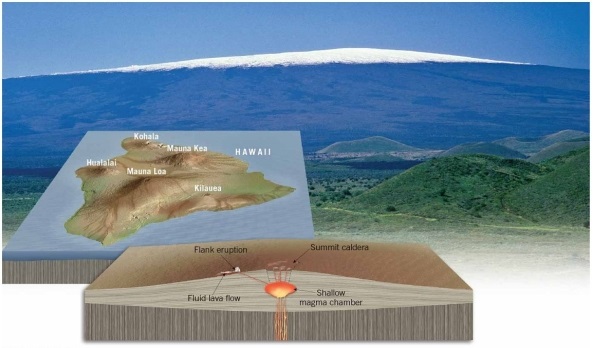
Mauna Loa, a volcano in Hawaii, is an excellent example of a ________.
A)shield volcano
B)cinder cone
C)composite volcano
D)volcanic neck

Unlock Deck
Unlock for access to all 63 flashcards in this deck.
Unlock Deck
k this deck
9
The recent volcanic activity in Yellowstone National Park is caused by ________.
A)subduction
B)a divergent plate boundary
C)intraplate volcanism
D)a transform plate boundary
A)subduction
B)a divergent plate boundary
C)intraplate volcanism
D)a transform plate boundary

Unlock Deck
Unlock for access to all 63 flashcards in this deck.
Unlock Deck
k this deck
10
A long-lived magma source located in the mantle is called a ________.
A)magma welt
B)plume
C)hot spot
D)basalt spout
A)magma welt
B)plume
C)hot spot
D)basalt spout

Unlock Deck
Unlock for access to all 63 flashcards in this deck.
Unlock Deck
k this deck
11
________ lava is the most abundant type erupted at oceanic spreading centers.
A)Rhyolitic
B)Andesitic
C)Basaltic
D)Granititc
A)Rhyolitic
B)Andesitic
C)Basaltic
D)Granititc

Unlock Deck
Unlock for access to all 63 flashcards in this deck.
Unlock Deck
k this deck
12
________ destroyed the city of St. Pierre, Martinique in 1902.
A)Lahars (volcanic mudflows)
B)A pyroclastic flow
C)Lava flows
D)Heavy ash fall
A)Lahars (volcanic mudflows)
B)A pyroclastic flow
C)Lava flows
D)Heavy ash fall

Unlock Deck
Unlock for access to all 63 flashcards in this deck.
Unlock Deck
k this deck
13
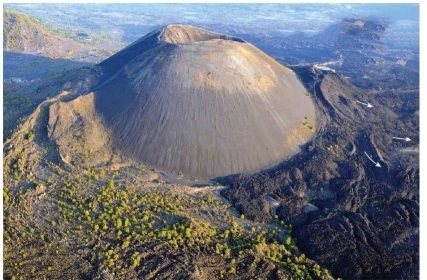
Parícutin is an example of a ________.
A)shield volcano
B)cinder cone
C)composite volcano
D)volcanic neck

Unlock Deck
Unlock for access to all 63 flashcards in this deck.
Unlock Deck
k this deck
14
The Columbia Plateau in the northwestern United States is an excellent example of ________.
A)an eroded shield volcano
B)a caldera
C)pyroclastic flow deposits
D)flood basalts
A)an eroded shield volcano
B)a caldera
C)pyroclastic flow deposits
D)flood basalts

Unlock Deck
Unlock for access to all 63 flashcards in this deck.
Unlock Deck
k this deck
15
A volcanic island arc is the result of ________.
A)subduction of continental crust underneath oceanic crust
B)subduction of oceanic crust underneath oceanic crust
C)subduction of continental crust underneath continental crust
D)subduction of oceanic crust underneath continental crust
A)subduction of continental crust underneath oceanic crust
B)subduction of oceanic crust underneath oceanic crust
C)subduction of continental crust underneath continental crust
D)subduction of oceanic crust underneath continental crust

Unlock Deck
Unlock for access to all 63 flashcards in this deck.
Unlock Deck
k this deck
16
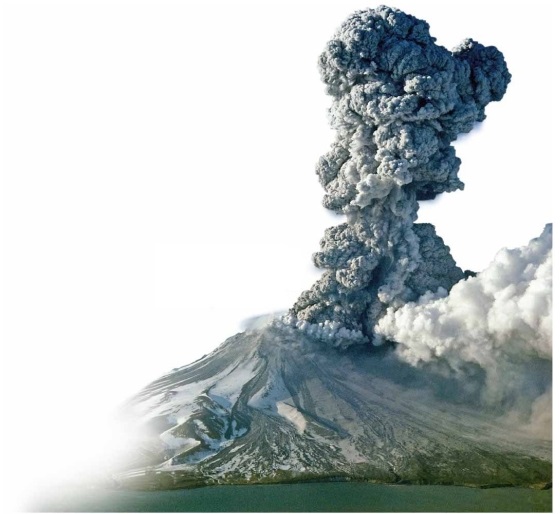
This is a photograph of Augustine volcano in Alaska. Judging by its shape, and the eruptive activity in the photo, what kind of volcano is it?
A)shield volcano
B)cinder cone
C)composite volcano
D)volcanic neck

Unlock Deck
Unlock for access to all 63 flashcards in this deck.
Unlock Deck
k this deck
17
Three of the following statements about the May, 1980 eruption of Mount St. Helens are true. Which one is false?
A)During the eruptive period, the mountain peak was substantially enlarged by new lava flows and pyroclastic debris.
B)Plumes of ash rose high into the atmosphere during the major eruptive events.
C)Mudflows called lahars accompanied the major eruptive events.
D)The most powerful explosive event was preceded by a massive landslide.
A)During the eruptive period, the mountain peak was substantially enlarged by new lava flows and pyroclastic debris.
B)Plumes of ash rose high into the atmosphere during the major eruptive events.
C)Mudflows called lahars accompanied the major eruptive events.
D)The most powerful explosive event was preceded by a massive landslide.

Unlock Deck
Unlock for access to all 63 flashcards in this deck.
Unlock Deck
k this deck
18
________ tend to increase the explosive potential of a magma body beneath a volcano by the greatest amount.
A)High viscosity and lots of dissolved gas
B)High viscosity and very low levels of dissolved gas
C)Low viscosity and lots of dissolved gas
D)Low viscosity and very low levels of dissolved gas
A)High viscosity and lots of dissolved gas
B)High viscosity and very low levels of dissolved gas
C)Low viscosity and lots of dissolved gas
D)Low viscosity and very low levels of dissolved gas

Unlock Deck
Unlock for access to all 63 flashcards in this deck.
Unlock Deck
k this deck
19
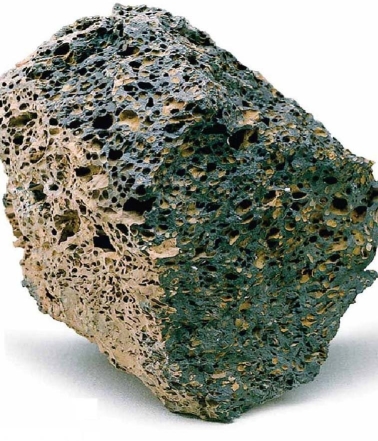
What caused the many small holes that are seen in this sample of scoria?
A)impacts by volcanic bombs
B)dissolving away of minerals
C)degassing of volatiles
D)raindrops

Unlock Deck
Unlock for access to all 63 flashcards in this deck.
Unlock Deck
k this deck
20
If you want to melt a rock, even partially, there are three methods you can employ. Which of the following is NOT a way that melting is triggered in rocks in the Earth?
A)adding heat
B)releasing pressure
C)adding water
D)removing water
A)adding heat
B)releasing pressure
C)adding water
D)removing water

Unlock Deck
Unlock for access to all 63 flashcards in this deck.
Unlock Deck
k this deck
21
Gases like water vapor or carbon dioxide that get released from lava or magma are referred to as ________.

Unlock Deck
Unlock for access to all 63 flashcards in this deck.
Unlock Deck
k this deck
22
Crater Lake in Oregon actually occupies a caldera, not a crater.

Unlock Deck
Unlock for access to all 63 flashcards in this deck.
Unlock Deck
k this deck
23
Eruption columns would be more likely to occur at a shield volcano like Kilauea than at a composite volcano like Mount St. Helens.

Unlock Deck
Unlock for access to all 63 flashcards in this deck.
Unlock Deck
k this deck
24
How do calderas form?
A)collapse of a partially emptied magma chamber
B)explosive eruption carving out a big hole in the ground
C)impact of a meteorite
D)erosion by lava flows
A)collapse of a partially emptied magma chamber
B)explosive eruption carving out a big hole in the ground
C)impact of a meteorite
D)erosion by lava flows

Unlock Deck
Unlock for access to all 63 flashcards in this deck.
Unlock Deck
k this deck
25
In magma, dissolved gases make up less than 10% of its weight.

Unlock Deck
Unlock for access to all 63 flashcards in this deck.
Unlock Deck
k this deck
26
Multiple plutons can coalesce (merge)to form a(n)________.
A)batholith
B)sill
C)neck
D)dike
A)batholith
B)sill
C)neck
D)dike

Unlock Deck
Unlock for access to all 63 flashcards in this deck.
Unlock Deck
k this deck
27
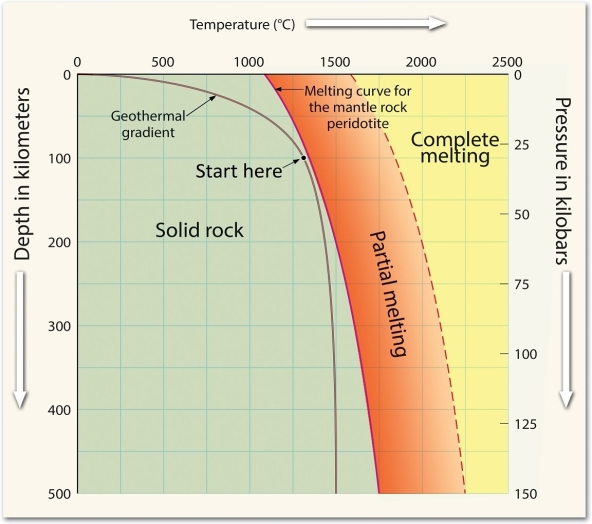
Examine the figure and consider a rock under the conditions shown by the black dot labeled "Start here." What would you have to do to that rock in order to cause it to begin melting?
A)increase its temperature
B)decrease its pressure
C)add water
D)Any of these could help the rock to melt.

Unlock Deck
Unlock for access to all 63 flashcards in this deck.
Unlock Deck
k this deck
28
The viscosity of magma increases with an increasing percentage of silica.

Unlock Deck
Unlock for access to all 63 flashcards in this deck.
Unlock Deck
k this deck
29
Ash and lapilli are different sized pyroclastic particles.

Unlock Deck
Unlock for access to all 63 flashcards in this deck.
Unlock Deck
k this deck
30
Generally speaking, Hawaiian volcanoes are more explosive than the volcanoes of the Cascade Range.

Unlock Deck
Unlock for access to all 63 flashcards in this deck.
Unlock Deck
k this deck
31
The Andes are an example of a continental volcanic arc forming at convergent plate boundary.

Unlock Deck
Unlock for access to all 63 flashcards in this deck.
Unlock Deck
k this deck
32
Repeated eruptions of relatively fluid lava from fissures can eventually cause an area to be covered by flood basalts.

Unlock Deck
Unlock for access to all 63 flashcards in this deck.
Unlock Deck
k this deck
33
Magma generation almost always involves partial melting, not complete melting of the source rock.

Unlock Deck
Unlock for access to all 63 flashcards in this deck.
Unlock Deck
k this deck
34
Water vapor is the most abundant gaseous component dissolved in most magmas.

Unlock Deck
Unlock for access to all 63 flashcards in this deck.
Unlock Deck
k this deck
35
In general, cinder cones are much larger than shield volcanoes.

Unlock Deck
Unlock for access to all 63 flashcards in this deck.
Unlock Deck
k this deck
36
Lava tubes would be more likely to be form at a shield volcano like Kilauea than at a composite volcano like Mount St. Helens.

Unlock Deck
Unlock for access to all 63 flashcards in this deck.
Unlock Deck
k this deck
37
A high viscosity means that a lava is very fluid or runny.

Unlock Deck
Unlock for access to all 63 flashcards in this deck.
Unlock Deck
k this deck
38
Hawaii is located on a plate boundary.

Unlock Deck
Unlock for access to all 63 flashcards in this deck.
Unlock Deck
k this deck
39
Which of the following best describes the bedrock in the Sierra Nevada Mountains in California?
A)laccolith made of basalt
B)batholith made of granite
C)dike made of andesite
D)cinder cone
A)laccolith made of basalt
B)batholith made of granite
C)dike made of andesite
D)cinder cone

Unlock Deck
Unlock for access to all 63 flashcards in this deck.
Unlock Deck
k this deck
40
Lava flows are the greatest volcanic hazard.

Unlock Deck
Unlock for access to all 63 flashcards in this deck.
Unlock Deck
k this deck
41
________ volcanoes are closely associated with convergent plate boundaries and subduction zones.

Unlock Deck
Unlock for access to all 63 flashcards in this deck.
Unlock Deck
k this deck
42
Match the descriptions and locations with one of the three principle kinds of volcanoes.

A)composite/stratovolcanoes
B)shield volcanoes
C)cinder cones
1)large, fairly steep-sided cones composed of alternating layers of lava flows and pyroclastic material
2)small basaltic cones built during one, short, eruptive episode; dominated by pyroclastic material
3)volcanoes of southwestern Alaska and the Aleutian Islands
4)big volcanoes of Hawaii
5)volcano Parícutin in Mexico

A)composite/stratovolcanoes
B)shield volcanoes
C)cinder cones
1)large, fairly steep-sided cones composed of alternating layers of lava flows and pyroclastic material
2)small basaltic cones built during one, short, eruptive episode; dominated by pyroclastic material
3)volcanoes of southwestern Alaska and the Aleutian Islands
4)big volcanoes of Hawaii
5)volcano Parícutin in Mexico

Unlock Deck
Unlock for access to all 63 flashcards in this deck.
Unlock Deck
k this deck
43
The Year Without A Summer (1816)was triggered by ________.

Unlock Deck
Unlock for access to all 63 flashcards in this deck.
Unlock Deck
k this deck
44
Label each of the features of the volcano in the boxes provided.
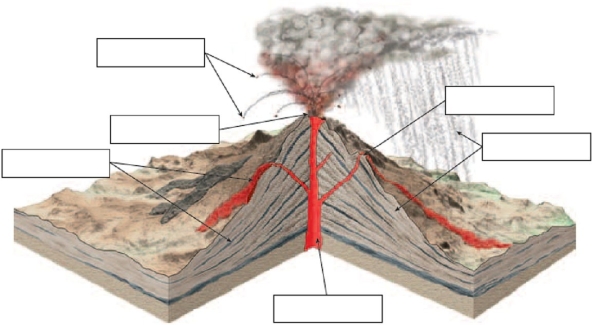


Unlock Deck
Unlock for access to all 63 flashcards in this deck.
Unlock Deck
k this deck
45
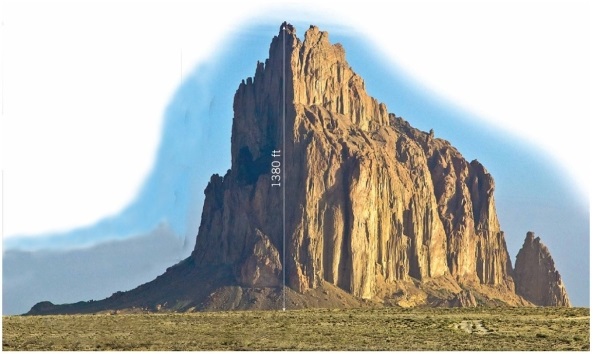
Shiprock, New Mexico, is a classic example of ________.

Unlock Deck
Unlock for access to all 63 flashcards in this deck.
Unlock Deck
k this deck
46
When magma intrudes other rocks, it may ________ before reaching the surface, producing intrusions called plutons.

Unlock Deck
Unlock for access to all 63 flashcards in this deck.
Unlock Deck
k this deck
47
________ are pyroclastic materials that are larger than ash, but smaller than blocks or bombs.

Unlock Deck
Unlock for access to all 63 flashcards in this deck.
Unlock Deck
k this deck
48
Shield volcanoes consist of many successive layers of ________ and lack significant amounts of pyroclastic debris.

Unlock Deck
Unlock for access to all 63 flashcards in this deck.
Unlock Deck
k this deck
49
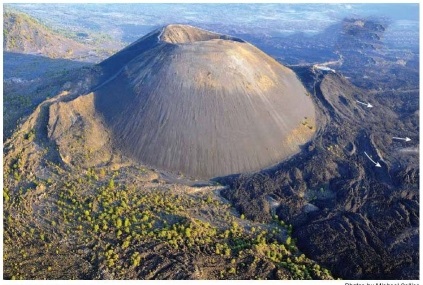
What kind of volcano is pictured here?

Unlock Deck
Unlock for access to all 63 flashcards in this deck.
Unlock Deck
k this deck
50
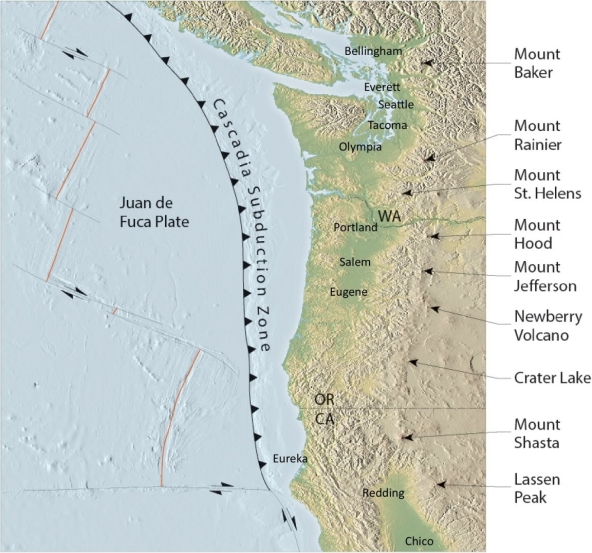
Examine the map of the Cascadia subduction zone and explain why an eruption of Mount Rainier would be considerably more destructive than the similar eruption of Mount Mazama, which formed Crater Lake during a massive eruption 7,700 years ago.

Unlock Deck
Unlock for access to all 63 flashcards in this deck.
Unlock Deck
k this deck
51
________ are pyroclastic materials ejected from volcanoes as liquid droplets; they cool and form a solid crust before they land.

Unlock Deck
Unlock for access to all 63 flashcards in this deck.
Unlock Deck
k this deck
52
When mantle peridotite partially melts beneath an oceanic ridge, ________ magma is produced.

Unlock Deck
Unlock for access to all 63 flashcards in this deck.
Unlock Deck
k this deck
53
A small, igneous rock body emplaced at shallow depths by uplift and arching of the overlying, older strata is a(n)________.

Unlock Deck
Unlock for access to all 63 flashcards in this deck.
Unlock Deck
k this deck
54
A(n)________ is a dangerous, fast moving, hot, turbulent cloud of volcanic gases and solid particles.

Unlock Deck
Unlock for access to all 63 flashcards in this deck.
Unlock Deck
k this deck
55
Imagine that you have a friend moving to a new area on the North American continent where there is a subduction zone offshore. What sorts of volcanoes would be most likely in this setting? Which volcanic hazards should you warn your friend to be alert for?

Unlock Deck
Unlock for access to all 63 flashcards in this deck.
Unlock Deck
k this deck
56
Discuss the six different tectonic settings in which volcanism can occur, and why magma is produced at each location.

Unlock Deck
Unlock for access to all 63 flashcards in this deck.
Unlock Deck
k this deck
57
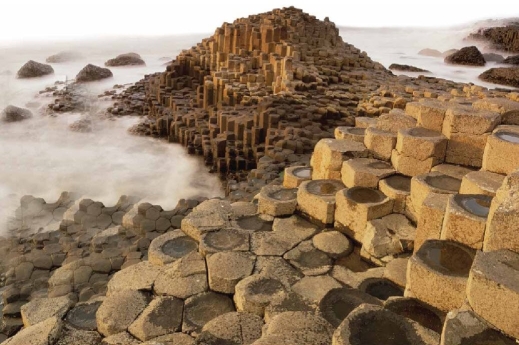
What igneous feature is shown in this photograph? ________

Unlock Deck
Unlock for access to all 63 flashcards in this deck.
Unlock Deck
k this deck
58
The difference between lava and magma is lava is found ________ Earth's surface; whereas magma is ________ the surface.

Unlock Deck
Unlock for access to all 63 flashcards in this deck.
Unlock Deck
k this deck
59
________ is type of basaltic lava flow has its surface covered with sharp-edged, angular blocks and rubble.

Unlock Deck
Unlock for access to all 63 flashcards in this deck.
Unlock Deck
k this deck
60
Volcanoes are generally not preserved in the geologic rock record as they are eroded away. However, the various materials erupted from volcanoes are often found preserved in the rock record. How could you infer what type of volcano erupted in a given area based on the type of volcanic deposits now found as layers of rock? Give specific examples and briefly discuss if some materials may be linked to different types of volcanoes.

Unlock Deck
Unlock for access to all 63 flashcards in this deck.
Unlock Deck
k this deck
61
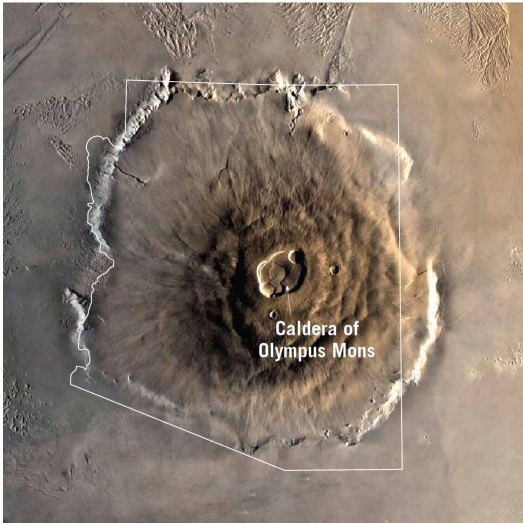
Olympus Mons is an enormous volcano on Mars. It is the largest volcano in the Solar System. Compositionally and structurally, Olympus Mons is most like a shield volcano on Earth, but it is many times larger. Why should Mars produce such a monstrous shield volcano, while Earth isn't capable of producing one that large?

Unlock Deck
Unlock for access to all 63 flashcards in this deck.
Unlock Deck
k this deck
62
Pick three of the following volcanic regions and assign it to one of the three types of volcanism (convergent plate boundaries, divergent plate boundaries, or intraplate volcanism):
a. Crater Lake
b. Hawaii's Kilauea
c. Mount St. Helens
d. East African Rift
e. Yellowstone
f. Vesuvius
g. Deccan Plateau
h. Iceland
Give a brief explanation of how the volcanoes formed at each of the three locations you select.
a. Crater Lake
b. Hawaii's Kilauea
c. Mount St. Helens
d. East African Rift
e. Yellowstone
f. Vesuvius
g. Deccan Plateau
h. Iceland
Give a brief explanation of how the volcanoes formed at each of the three locations you select.

Unlock Deck
Unlock for access to all 63 flashcards in this deck.
Unlock Deck
k this deck
64
Match between columns

Unlock Deck
Unlock for access to all 63 flashcards in this deck.
Unlock Deck
k this deck


